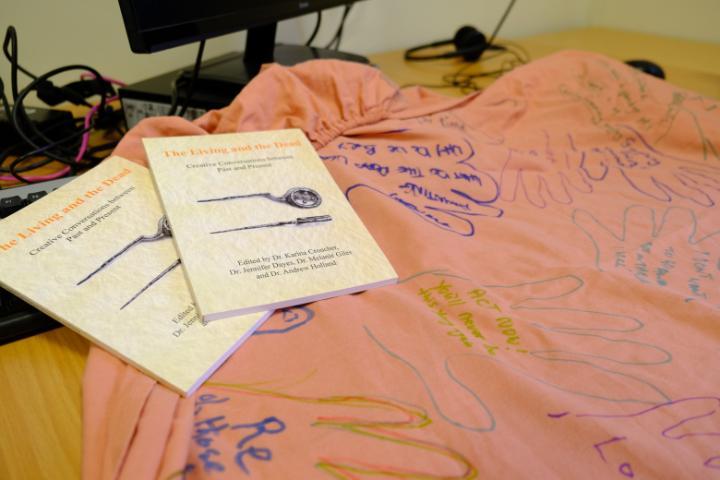Continuing Bonds
As an example of challenging orthodoxies and in demonstrating the explicit link between the past, the present and indeed the future, the Continuing Bonds project is a unique exemplar of archaeology’s value, with testimony from participants evidencing profound impact on personal and professional growth.
Continuing Bonds: exploring the meaning and legacy of death through past and contemporary practice is an Arts and Humanities Research Council (AHRC)-funded collaboration between the University’s archaeologists, health care/nursing, and psychologists to use archaeology as a positive medium to enable productive conversations about death, dying, loss and bereavement, subjects that many find difficult to talk about.
Dr Karina Croucher said: “While death and grieving are difficult topics, open discussion can build resilience and enable planning and more positive experiences. The pandemic has provided a timely and heightened context to such issues.”
Working with the LOROS Hospice in Leicester, the project provided a framework for reflecting on death, through archaeological case studies that revealed the variety of methods by which past societies have dealt with death and the dead.
Dr Croucher said: “It focused on an enduring concept: that of ‘continuing bonds’ with the dead, which recognises that death is not the end of relationships between the living and the dead, but that the dead continue to have meaning and significance in the lives of the living.”
-1-457x274.jpg)
Dr Karina Croucher
Participants in the project included representatives from health and social care, counselling, funerary services, faith leadership, charitable volunteering, educators and students. Workshops were held exploring the diversity of rituals, beliefs and practices around death and loss, including discussion around archaeological artefacts that illustrated both differences and similarities in belief and perception. These discussions enabled participants to appreciate and understand different concepts of death and prompted questioning and reappraisal of their own held beliefs, attitudes, values and biases. More than 90 per cent of participants reported that the discussions prompted open and effective conversations that previously they would have had difficulty with and helped them to articulate thoughts and feelings in a new way.
Participants also reported personal growth and development because of taking part in the workshops. In many cases this has led to improved professional practice, even among experienced health and social care practitioners, such as an improved confidence and ability to empathise with clients. The Continuing Bonds team has used this impact to create an online resource for continuing professional development for counsellors, which uses archaeological and contemporary examples to explore death and grief.
A development of this work has been a project with young people, Child Bereavement UK, Bradford Bereavement Support, and the University of Wolverhampton called Dying to Talk. The project created resources with young people, for young people, including a film for school pupils. In the unscripted film, young people spoke about their individual experiences of the progression from talking about archaeology through to discussing their personal reflections, even going on to deliver practical advice about dealing with death and bereavement, including good conversation starters.
Workshop participants’ testimonies included:
“My confidence has grown since attending the workshop, I have worked since that time with many more clients. A part of the growth in confidence is that I feel more touched as a human and aware of being a human, and somehow this makes me braver. I have an enriched sense of connection with others.”
“Without a shadow of doubt, involvement in the project has been life changing… this has been hugely influential on my life.”
Working with the University of Manchester, the AHRC-funded Continuing Bonds: Creative Dissemination project used archaeology and original Continuing Bonds experiences to normalise talk of the dead and inspire creative writing, through workshops with members of the public in Bradford, Manchester and Sheffield, culminating in an anthology and celebration events where participants read their work to friends, families and stakeholders.

The Living and the Dead anthology
The impact that the project has had in linking archaeology with end-of-life care has been recognised, with members of the team being invited to speak at the annual conference of the Association of Palliative Care Services, the bi-annual Palliative Care Congress and to address Bradford’s Managed Clinical Work Forum.
Find out more
As part of our Research in Conversation video series, Dr Karina Croucher and Dr Eleanor Bryant discuss the impact of the Continuing Bonds research project that uses archaeology to discuss topics around death and bereavement.
